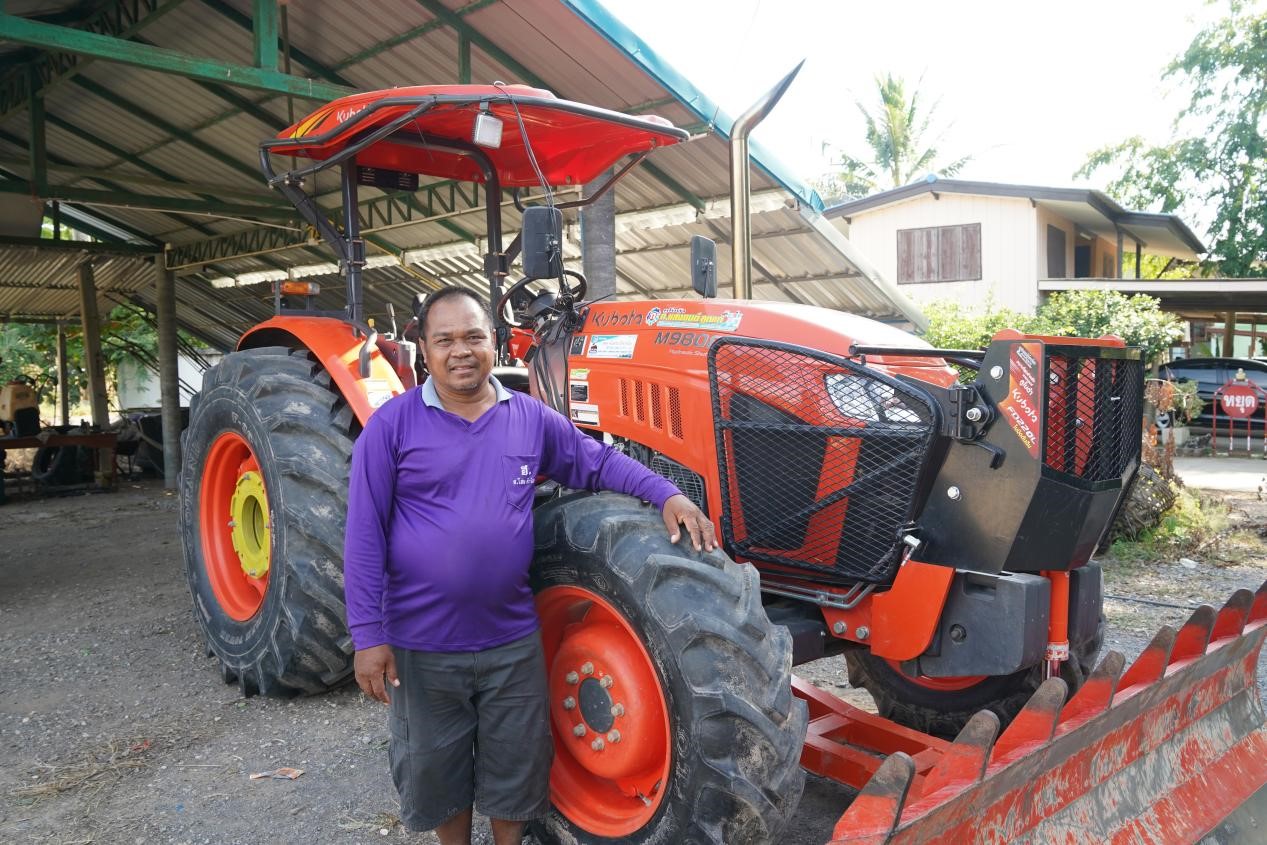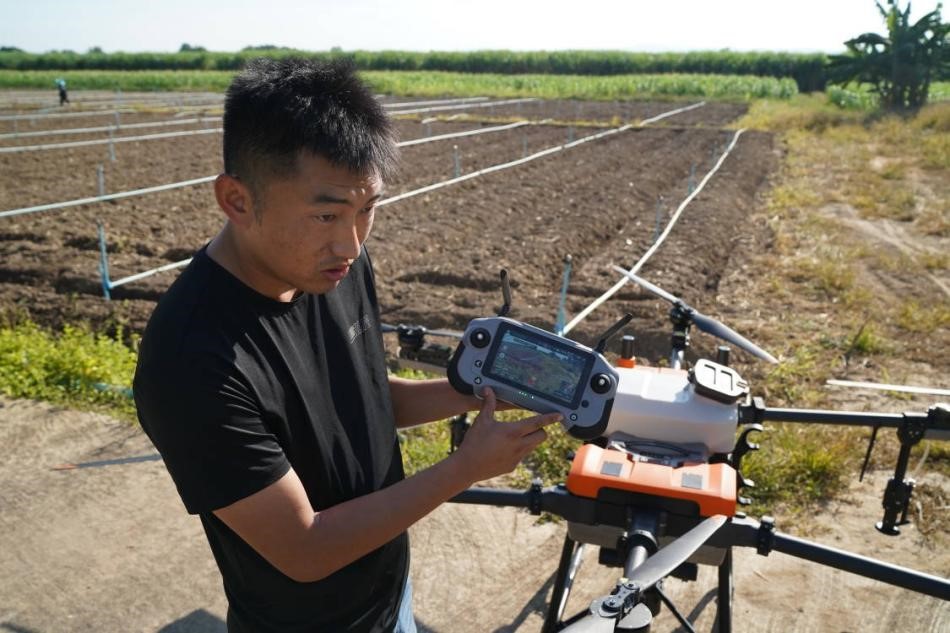Chinese company’s technology help farmers in Kanchanaburi to use less manpower

As Southeast Asia’s most important agricultural country and the world’s top producer of natural rubber and rice exporter, Thailand is now seeking to transform its agricultural sector with support from China’s smart farm technology.
In Danmakamtia, a village in Kanchanaburi province, 50-year-old Somboon Songwainiaw is one of the 30 pioneers in the village who have benefited from using technology, specifically the HD408 autopilot steering system designed and produced by Huida Tech, a Chinese company specializing in smart farm solutions.
Somboon, who owns a total of 22.4 hectares of farmland mainly for sugarcane, tomato and cassava, has two of his tractors equipped with Huida’s smart steering system for six months.
The system, equipped with sensors on tractors and guided by satellite navigation, helps farmers to operate the tractors automatically. Following set routes based on different plant species and varying farmland conditions, the system is capable of delivering 1.5 centimeter accuracy.
“Farm work is highly dependent on the seasons and weather. During the harvest or planting season, bigger farms usually suffer from the shortage of hands. Moreover, the cost of hiring helpers is high. For ploughing, it will cost around 1,600 baht ($47) per rai (1,600 square meters),” Somboon said. The tractors with an autopilot steering system helped him to reduce the cost to only 200 baht per rai.
The system — including an autopilot system for precise operations, a leveling system for automatic land leveling, and a monitoring feature for analyzing job performance — can be equipped on many agriculture machines apart from tractors.
“The system can lead tractors or other machinery to achieve automatic operation. Also, it can be operated at night as the route is well-designed and guided by sensors instead of human eyes,” said Liang Fei, sales director of Huida Tech for Asia Pacific region.
READ MORE: Thailand eyes economic rebound
“With it, farmers can complete the task much more easily, avoiding the errors and fatigue of human operation. Meanwhile, the technology has also improved the operational safety of agricultural machinery, saved agrochemical cost and raised farming efficiency,” she explained.
Since its establishment in 2009 in Heilongjiang province, Northeast China, the company has delivered more than 35,000 autopilot steering systems, covering a total of 20.23 million hectares worldwide, including in Laos, Vietnam, Turkiye, Brazil, Mexico and the Republic of Korea.
Huida has also developed key components to optimize spraying and spreading systems, making them adaptable to a wider range of application scenarios. So far, its intelligent water-saving irrigation system and agriculture drones have been piloted in Vietnam and Thailand.
“The region enjoys advantages and great potential to develop smart agriculture, as it is the world's major production base of rice, sugarcane and also tropical fruits. Taking drones for example, it will significantly improve the efficiency of spraying pesticides and fertilizers in hot weather and mountain areas,” Liang said.
The Board of Investment of Thailand revealed that approximately 43 percent of the kingdom’s total land area is used for agricultural activities. The country’s agricultural sector generates $41.2 billion in value annually, contributing 8 percent to the kingdom’s GDP. There are about 12 million farmers in Thailand, indicating that there is room for further development of its agriculture.
Local media reported that Thailand now has about 5,000 drones monitoring 4 million rai of land throughout the country. In October, Deputy Prime Minister and Digital Economy and Society Minister Prasert Jantararuangtong announced that the country is ready to support efforts to boost farmers’ access to drones.
“Drones are my next target. Their high efficiency is very impressive,” said Somboon. “Apart from reducing costs, the drone will also protect farmers’ safety. After purchasing the autopilot steering system, I learned from Huida that they also produce drones, which is very attractive to me.”

With a 360-degree rotating radar, the drone designed by Huida is able to autonomously avoid obstacles, said the company’s engineer Chen Guangfei. “In just four hours, it can complete spraying about 40 hectares. And the operation is very easy. Based on our previous experience, even for farmers aged at around 50 years, they can operate themselves after two days’ training course.”
According to Liang, Huida is set to introduce the company’s intelligent water-saving irrigation system to Thai farmers. She said the system integrates advanced monitoring and control technology with software, which can control the entire irrigation process from the pump room to the field.
Zhang Yu, Huida’s chief executive officer, said the company plans to establish an innovation center in Thailand within the next two years, to better provide comprehensive smart farming solutions to local farmers, with the goal of creating a sustainable agricultural ecosystem driven by scientific planning, intelligent management and large-scale production.
ALSO READ: Chinese firms cast nets far and wide
“We are committed to driving the agricultural industry forward, creating a more prosperous and sustainable future for farmers and agricultural producers, and contributing to the food security and environment protection in the region as well as the world,” he said.
Over the past year, several economists, including those from the World Bank and the International Monetary Fund, have urged Thailand to focus on reforming the country’s structure and human capital development amid climate change, which has resulted in less rainfall and other weather problems that pose risks to agriculture.
In July, Peeraphan Korthong, director-general of Thailand’s Department of Agricultural Extension, said in an interview with local news portal The Nation that science and technology play an important role in the agriculture sector due to climate change.
“Thailand should take action on digitization and technology to boost competitiveness and keep up with the global move toward a digital and low-carbon economy,” Peeraphan said. He added that young farmers should be able to access training, technology and cost mitigation to raise their productivity and discipline.
Contact the writer at yangwanli@chinadaily.com.cn


